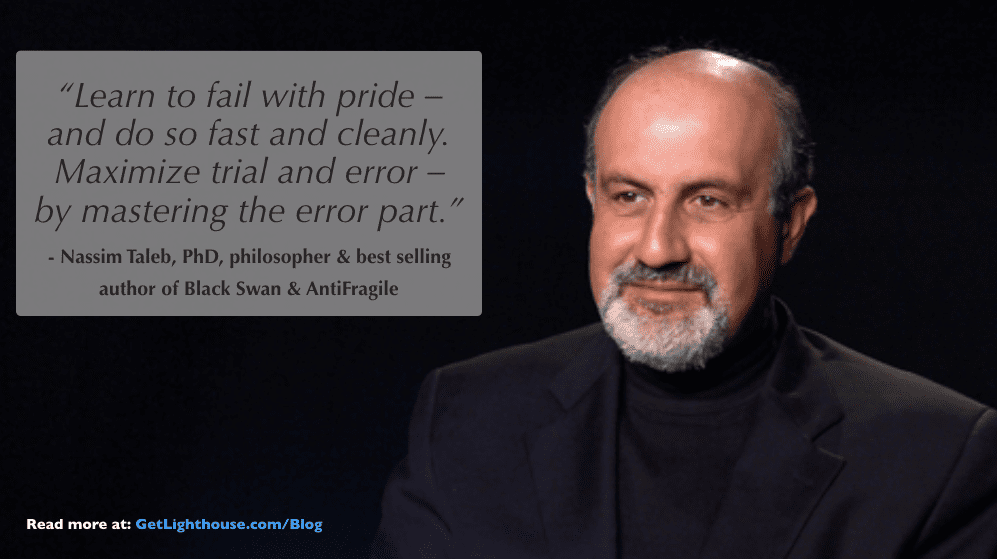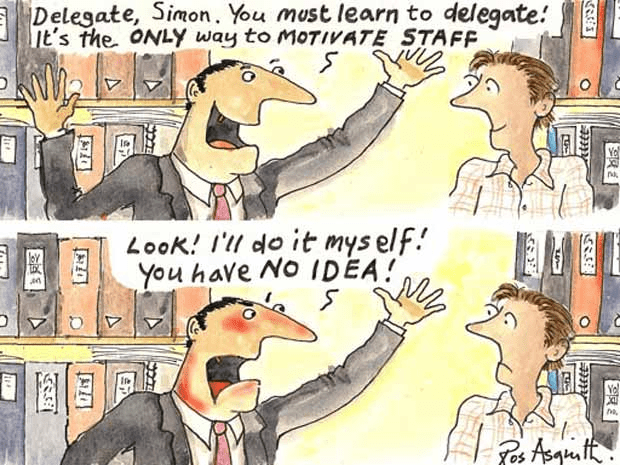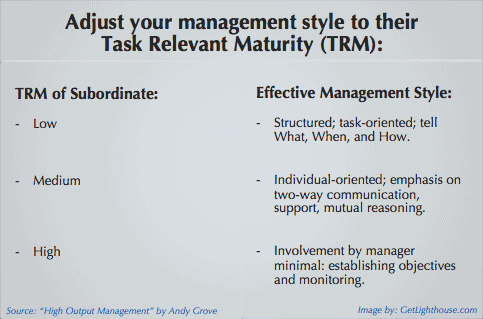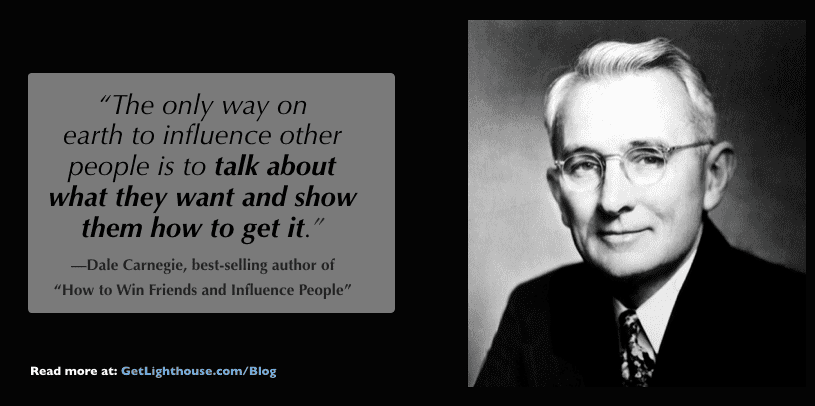What can you do to become a more approachable, empathetic leader? How can you ensure you and your team are on the same page, as well as understand and respect each other? What are the best ways to improve your people skills?
As a manager, your responsibilities are as much about delivering results as they are about motivating your team. Unfortunately, managing people can get very challenging. It requires patience, understanding, and setting a good example through your own behavior.
Dale Carnegie, a famous American pioneer of leadership training, knew this, which is why he dedicated his life to giving advice on how to do it successfully.
In this post, we've prepared four of our favorite Dale Carnegie quotes you can use to grow, and actionable ways to apply them to your team.
4 Dale Carnegie Ideas You Can Apply Today to be a more Empathetic Leader
Born into poverty on a farm in Missouri, Dale Carnegie took an interest in public speaking, self-improvement, and interpersonal skills very early in his life.
This led him to write best-selling books such as "How to Win Friends and Influence People” and "How to Stop Worrying and Start Living”. They're so impactful that they're still best-sellers 90 years later!
In addition to writing books, he also developed many courses and training programs for leaders that continue to be put to use today.
As one of our favorite thinkers we decided to share some of Carnegie's wisdom with you. We also share how you can use it to build more meaningful relationships with your team and grow.
Table of Contents:
- Dale Carnegie Quotes #1: "Develop success from failures. Discouragement and failure are two of the surest stepping stones to success.”
- Dale Carnegie Quotes #2: "You can make more friends in two months by becoming interested in other people than you can in two years by trying to get other people interested in you.”
- Dale Carnegie Quotes #3: "Do the hard jobs first. The easy jobs will take care of themselves.”
- Dale Carnegie Quotes #4: "He always gave people the opportunity to do things themselves; he never told his assistants to do things; he let them do them"

Dale Carnegie Quotes #1: "Develop success from failures. Discouragement and failure are two of the surest stepping stones to success.”
Carnegie was a strong believer in learning from experience and mistakes. He believed that to succeed, people have to be given opportunities to fail. In one of his speeches, he proclaimed: "Any fool can criticize, condemn, or complain.” What he advocated for instead was being understanding and showing patience.
And he's far from the only one with this belief. Some of the most successful people today share it.
For example, Jeff Bezos wrote about the importance of failure for Amazon in one of his shareholder letters:
"One area where I think we are especially distinctive is failure. I believe we are the best place in the world to fail (we have plenty of practice!), and failure and invention are inseparable twins.”
Michael Jordan was quoted saying: "I've failed over and over and over again in my life. And that is why I succeed.” We also know systems in nature possess the ability to reorganize after failing.
But failing is such a broad topic, it's difficult to think of concrete suggestions on how to let your team do it. Here are two principles we recommend to encourage your team to embrace mistakes and grow from them.

A balanced approach to failing: The Waterline Principle and psychological safety
The company W.L. Gore uses a great metaphor for teaching its employees about how to fail successfully. They call it "the Waterline Principle”:
"The waterline principle means that it's ok to make a decision that might punch a hole in the boat as long as the hole is above the waterline so that it won't potentially sink the ship.
But, if the decision might create a hole below the waterline which might cause the ship to sink, then associates are encouraged to consult with their team so that a collaborative decision can be made.”
What this means is that you should encourage your team to take chances, but do so on the right projects. They should then be more careful about making mistakes, or taking too big a risk, if the action or plan could have irreversible, significant consequences (i.e. losing a key client, not delivering an important project on time, risking the company on a wild bet, etc).
And if your team is still too afraid to make mistakes and speak their mind, you may have an issue with a lack of psychological safety among them. Google's research from 2011 showed that teams with an open-minded culture, or psychological safety, were far more likely to be successful in their work.
You can foster psychological safety by:
- Hiring people who have different ideas and outlooks on things than you
- Being aware of how your presence affects their work and giving up a bit of control to allow them to express themselves
- Making it safe for people to disagree, even with you
By combining the Waterline Principle and nurturing psychological safety, people will feel more comfortable speaking their minds. They'll also be more willing to try new things and feel less discouraged by their mistakes.
If you want to read more about these topics, check out the following links:
- A detailed guide on how to build psychological safety for your team
- The importance of failure in nature, and how it applies to leaders

Dale Carnegie Quotes #2: "You can make more friends in two months by becoming interested in other people than you can in two years by trying to get other people interested in you.”
Dale Carnegie knew that rapport is the foundation of every meaningful relationship. He stressed the importance of finding common topics with other people and carefully listening to them. You can find dozens of quotes along these lines in his book "How to Win Friends.”
Carnegie believed that the most effective way to engage people was to understand them by learning about them and their motivations. Andy Grove, former CEO and co-founder of Intel, shared this idea, which is why he recommended meeting with your team members for an hour at least once a week. It takes time to learn about someone and what makes them tick.
Unfortunately, many managers avoid building rapport because they believe they have more pressing things to do. This can create issues with trust, communication, and collaboration.
Here are concrete ways to build rapport with your team and get them to open up to you to avoid this.
How to build rapport with your team
It takes just a little effort to build trust, loyalty, and understanding with your team. You are likely to have things in common with just about anyone you meet if you know what to ask.
Here are some ways you may find you have something in coming with each person on your team, or topics to explore to get to know what matters to each of them:
Hobbies
- You both appreciate art (i.e. museums, art shows, etc.)
- You both enjoy hiking and the outdoors.
Family
- You both have children or are starting families.
- You both have a sister(s) or brother(s) or were the same oldest, youngest, middle kid.
Sports
- You both love the same sports team or player.
- You both play the same sport.
Life Goals
- You both love to travel or have the same travel goals.
- You both want to learn a new skill, start a hobby, or join a club.
Remember: all it takes is one thing in common to get someone to open up. However, once you find that topic, keep trying to get to know them better. The more connections you grow with them, the more open they will be in the future.
Follow Dale Carnegie's advice and be a great listener. They'll feel appreciated and love you for your approachability and openness, even if you're simply interested in them, but not the same.
For more ideas on what to say to build better relationships, check out the following posts:
- 82 Ways How To Build Rapport With Anyone You Work With
- How To Build Rapport With Your Remote Team Members

Dale Carnegie Quotes #3: "Do the hard jobs first. The easy jobs will take care of themselves.”
We all know there are always more tasks you could do than there is time in the day. Yet, some people seem better at organizing their time than others. Even worse, those who can't do it well find themselves working round the clock to keep up with their responsibilities. And that gets unsustainable very quickly.
To add to our struggles, working at home during and after COVID poses challenges of its own, including:
- Regular distractions and having to take care of your kids while working
- Stressing out about health, finances, the future, and other things
- Less than ideal home office setups
- Having to rebuild key routines and habits you had at work
This is what makes it so difficult to stay as productive as we'd be in regular working conditions.
To deal with an overwhelming amount of distractions and stay productive, Dale Carnegie recommends tackling your biggest tasks first.
We've come across this in the form of the so-called "Eat the Frog” concept before.
What is "Eat the Frog"?
"Eat the Frog” was a phrase coined by famous American writer Mark Twain. He once said:
"If it's your job to eat a frog, it's best to do it first thing in the morning. And If it's your job to eat two frogs, it's best to eat the biggest one first.”
Similar to Twain, but in a less metaphorical way, Carnegie suggests we should take on our hardest jobs first.
By itself, it sounds like a reasonable concept, but we have an even better way of making it work.
The importance of order: stones, pebbles, sand, and water
You can check out a simple, but very effective idea of how to think about the "Eat the Frog” concept, and how to prioritize all your day's tasks, in this short video:
As you can see, it's important to start with what's most important to ensure there's room for it before other things are added. This is why it's so easy to fall into the trap of spending your entire day on meetings and emails and never actually get anything done.
However, if you eat the frog first, you'll be freeing up space for sand, pebbles, and anything else on your to-do list that's not as important. And your team can be even more effective if they do the same, too.
For more ideas on how to deal with workplace challenges and be more productive, check out these posts:
- Why Priority Management Trumps Time Management
- 8 Ways To Address Your Workplace Stress You Can Start Today

Dale Carnegie Quotes #4: "He always gave people the opportunity to do things themselves; he never told his assistants to do things; he let them do them"
Carnegie is referring to industrialist Owen D. Young, who was known for nurturing independence among his employees.
We all know nothing can replace the experience of doing something yourself. It's the most effective way of learning and growing confident in your skills.
You can compare it to learning how to ride a bicycle. You can read about how to do it and watch videos of others until you're blue in the face–but until you try it yourself, it's very difficult to accomplish.
Now, that doesn't mean you should just leave your team unattended and let them figure everything out on their own. Instead, you should use Task Relevant Maturity to teach them new skills and empower them to be more independent over time.
The Definition of Task Relevant Maturity and How to Use It
The best way to build up your team's confidence and gradually teach them how to take on more responsibility is by applying the concept of Task Relevant Maturity. Coined by former Intel CEO, Andy Grove, it works as follows:
"How often you monitor should not be based on what you believe your subordinate can do in general, but on his experience with a specific task and his prior performance with it – his task relevant maturity…
As the subordinate's work improves over time, you should respond with a corresponding reduction in the intensity of the monitoring.”
Take a look at the table below to better understand what Grove meant. As a manager, you'll approach different situations based on the experience level of your team member for the specific task they're taking on:

If someone on your team is totally new at something, plan to be heavily involved in their work in the beginning. Show them how it's done, and share tips for avoiding rookie mistakes.
Be ready for any questions they may have and be there for them as they take their first steps. Don't assume they'll be great at something they haven't done just because they excel in other areas.
Then, as their Task Relevant Maturity grows, step back a little and give them more freedom to handle things on their own. Ask for their opinion on solving a problem and then coach them on any changes you'd make instead of immediately telling them the answer. This will help them adapt and grow comfortable with being more independent.
When they get really good at a task, praise them and give them the freedom to work even more independently. Tell them it's their job to take the lead while you listen and coach only when they absolutely need it. At this point, they'll have fewer questions for you and start running projects on their own. All you need to do is set expectations and make sure their work is meeting your standards.
Task Relevant Maturity is a very useful concept for every manager. It's perfect for increasing your team's confidence, and helping you balance being a hands off and hands on leader. It's also a great way to get your team to be more independent without overwhelming them.
You can check out these posts for more in-depth ways to use Task Relevant Maturity to level up your leadership skills:
- The Most Important Management Concept You're Missing: Task Relevant Maturity
- How You May be Causing Low Employee Morale by not Applying TRM
Conclusion
Dale Carnegie was a pioneer in many aspects of people management and leadership. Despite that, his ideas aren't overwhelmingly complex or demanding to implement. There's a reason his books continue to be read nearly a century later.
All of them are based on building better relationships with people, having more trust in them, and being a better version of yourself.
If you decide to use some of the four concepts we've discussed today, you'll notice how easy it is to start following them, and how much you gain from them.





